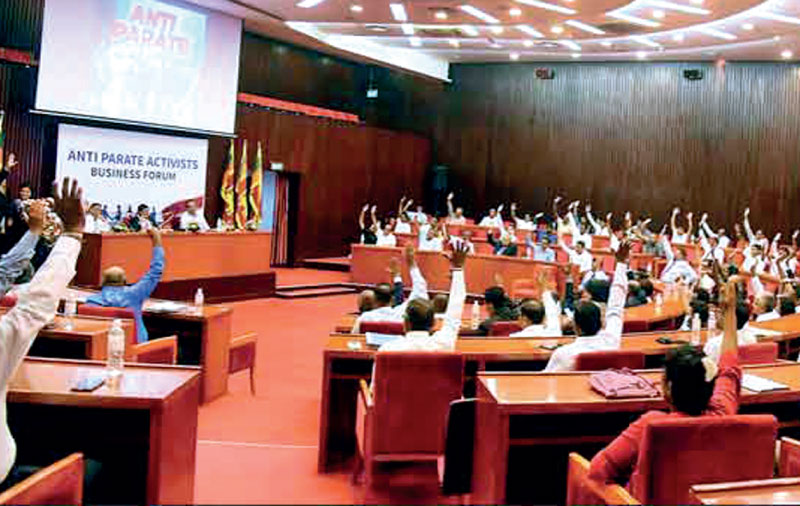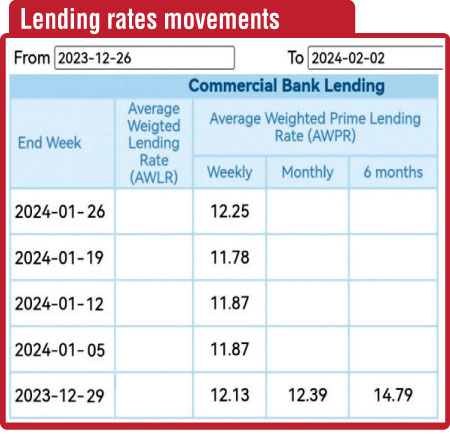Thursday Feb 19, 2026
Thursday Feb 19, 2026
Monday, 29 January 2024 00:15 - - {{hitsCtrl.values.hits}}

SMEs request Govt. to temporarily halt parate executions
 SME associations want parate rights to be deferred for 12 months to give breathing space to the tourism sector and SMEs, largely they claim due to the unreasonable lending interest rates of 2022 and the pandemic. Whilst the bankers say they need to hold the whip of “Parate Rights,” SMEs say banks shouldn’t be allowed to crack it irresponsibly. What has happened in the recent past they say is irresponsible cracking of the whip.
SME associations want parate rights to be deferred for 12 months to give breathing space to the tourism sector and SMEs, largely they claim due to the unreasonable lending interest rates of 2022 and the pandemic. Whilst the bankers say they need to hold the whip of “Parate Rights,” SMEs say banks shouldn’t be allowed to crack it irresponsibly. What has happened in the recent past they say is irresponsible cracking of the whip.
But the whip is important for banks because there are wilful defaulters who piggy back on the current sentiment to exploit the banking system. So, there is a need to be extremely cautious when compromising on parate rights to prevent these elements from exploiting banks and also impact the ratings of banks. However legislation could be brought in to ensure that the genuine entrepreneurs are protected from any exploitation. On the other hand CBSL needs to reach out to the respective banks on individual cases and put pressure on them to provide relief to the genuine cases.
Governor Central Bank has emphasised the crucial role of the Parate Law in maintaining stability within the banking system and safeguarding the funds of the depositors. Sri Lanka Banks Association (SLBA) has said parate execution against assets is used as a last resort and if parate rights are taken away, banks will be compelled to be extremely selective in lending. Also banks have given a number of moratoriums since 2019.
Banking sector stability
Banks are only expected to pursue parate after exhausting all revival and recovery options, (typically after around 3 to 4 years of efforts – moratoriums, restructures, concessionary rebates and WC loans, revival efforts, etc.). Any compromise of the parate rights should not strengthen the claims of wilful defaulters. There is an increasing trend of stay orders and opportunity for fair hearing by courts where businesses get 1-2 years further breathing space. However once a precedent is set, it will be politically difficult to reintroduce. This will create a moral hazard as even good customers will resist servicing debt causing impairment levels of banks to rise further, threatening banking sector stability.
It will become more difficult for SMEs to borrow as banks will further tighten underwriting standards, this will stifle credit and GDP growth in 2024, weakening economic resurgence. If there is no economic resurgence in 2024 (following four consecutive years of negative growth) this will exacerbate youth and skilled migration, increase poverty levels and make it more difficult to attract FDIs. 80% of troubled SME businesses have revived with the current business environment, due to tourism and remittances rebounding in the last six months, but certainly there is a need for working capital support from banks.
 Challenges
Challenges
To address the challenges faced by SMEs under the current Parate Law, a more specialised and financial structuring and even financial engineering is required. The proposed changes should aim at creating a balanced framework that protects the interests of both the banks and the SMEs. One credible option is to introduce a Tiered Recovery System. The Parate Law (which was introduced to mitigate the risk to depositor funds from the law’s delays) certainly needs reform. An unintended consequence was that over time banks relaxed their credit standards (i.e. granting credit to those borrowers who will invest the funds to create wealth and grow their businesses) confident that the provisions of the Parate’ Law would expedite the recovery of defaulting debts. Moreover in the 30 odd years since its legislation, defaulting borrowers have found legal loopholes to delay parate’ execution by the banks – some to the extent of filing FR cases against parate’ recovery actions. Therefore a good start would be to establish a structured tiered recovery system. This system would mandate banks to exhaust certain steps before resorting to parate action. These steps could include mandatory negotiation periods, mandatory negotiation benchmarks, defined responses by defaulting borrowers and even time bound and structured negotiating steps (on both sides) along with structured repayment plans, and engagement with restructuring advisers. Such a system would ensure that parate execution is truly a last resort, especially for those businesses who were viable prior to COVID.
Restructuring options
Another proposal is the creation of a specialised SME restructuring board: To ensure that both parties have fair representation. The tribunal could offer alternative solutions like loan restructuring, temporary moratoriums on payments, or even partial loan forgiveness in extreme cases. Another compromise could be to limit the forced sale to a certain percentage of the asset value, giving the SME time to recover and pay off the remaining debt, along the principal of chapter 11 insolvency support in the USA. This would prevent complete asset seizure at the first instance of default.
Also with the support of IFC set up a Mandatory Financial Counselling and Support for SMEs: CBSL must mandate banks to provide financial counselling and support services to SMEs before initiating parate execution. This would include advice on financial management, assistance in restructuring business models, Manpower solutions and guidance on alternative financing options (as banks strive to solidify their positions in a changing macroeconomic environment, serving small and medium-size businesses represents a significant opportunity to increase deposits, bringing in additional revenues during a challenging time. Institutions that can do so successfully need to understand the market well and offer comprehensive solutions that are tailored to address the needs of specific SME client segments; https://www.mckinsey.com/industries/financial-services/our-insights/banking-matters/five-ways-for-banks-to-better-serve-small-business-clients).
With the support of the World Bank or ADB the Government should look to set up an Insurance Fund or a National Asset Recovery Institution by converting an existing institution. This fund would act as a safety net, reducing the risk for banks and giving them more flexibility in dealing with loan defaults. Tax credits for banks supporting SMEs is also an option. This could include tax breaks for banks that restructure loans instead of resorting to parate execution. Broadly, a tax rebate to banks on the interest cost on the restructured loans, would go a long way in mitigating the cost of defaults to the banks. Another option is to consider granting exemption from FS VAT for interest income derived from lending to thrust sectors such as Tourism, Renewable Energy sector, etc., so that banks can consider lending at subsidised rates.
“SME clients present a key opportunity for banks to strengthen their revenues at a time when rising interest rates and industry turbulence prompt depositors to move their money elsewhere. The financial opportunity is significant. The United States is home to more than 30 million SMEs, representing 99% of the nation’s enterprises. Together, SMEs employ over 60 million workers, accounting for 47% of private-sector jobs. We estimate that small-business banking represents about $ 150 billion in annual revenue for the US banking industry across all products—deposits, loans, cards, cash management, and merchant services. That is about 17% of the US banking industry as a whole” – McKinsey’s 2023 SME survey of US.
References:
https://www.ft.lk/top-story/SMEs-request-Govt--to-temporarily-halt-parate-executions/26-756598
https://www.dailynews.lk/2023/12/30/admin-catagories/breaking-news/320864/cb-governor-spotlights-parate-law-for-maintaining-banking-systems-stability/
https://www.lankabusinessonline.com/sri-lanka-banks-association-defends-parate-execution-as-last-resort-to-protect-depositors-funds/
https://youtu.be/ rq- xPWjmrHY?si =6oz TlpL38quMoAy9